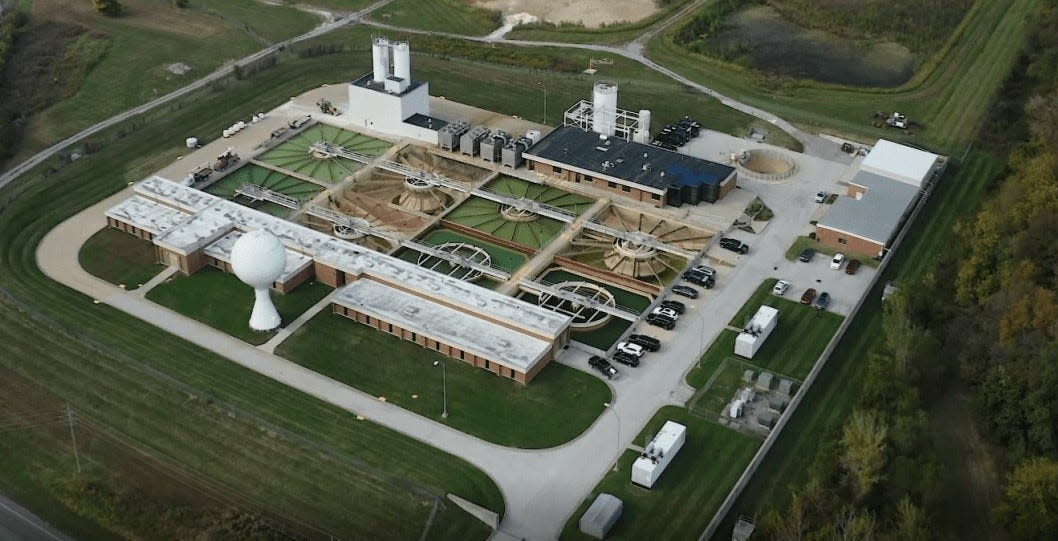Columbia likely won't have to make water treatment changes after new EPA rules on PFAS

Approximately two months ago, the Environmental Protection Agency, issued its new regulations on drinking water. These updated rules specifically addresses Per- and Polyfluoroalkyl Substances, also known as PFAS, and colloquially known as "forever chemicals."
PFAS are ubiquitous and used in carpet, clothing treatments and even firefighting foams, and also are impacting public health, accumulating in the blood, kidneys and liver of both humans and wildlife, modifying developmental, reproductive and other body systems.
Columbia Water and Light, prior to the EPA issuing the final rules, noted in March drinking water already complies with the rules that were then proposed. Now that the new rules will go into effect on June 25, not much has changed, wrote Columbia utilities spokesperson Matt Nestor in response to Tribune inquiries.
"The City of Columbia does not anticipate that the new regulation will impact Columbia. The PFAS chemicals that have been detected in our source water to this point have been below the levels set by the regulation," he wrote.
The Environmental Protection Agency considers PFAS and its subcategory chemicals PFOA, PFOS, PFHxS, PFNA, GenX and mixtures among them as an emerging contaminant for water systems, including at water sources.
"Water systems are now required to monitor for the six chemicals for the next three years and have a total of five years from now to make any necessary treatment improvements to reduce PFAS," Nestor wrote. "The city continues to monitor our water and changes to state and federal guidelines. The city has the ability to install advanced treatment technologies in the future to address the removal of emerging contaminants such as PFAS or other currently unregulated contaminants."
In Columbia, testing dating back to 2018 and as recent as July 2023 found no PFAS in Columbia water after it finished going through treatment at the McBaine Water Treatment Plant. That doesn't mean it has not been found at city water sources.
"Although the EPA's guidance requires utilities to sample finished water, the city conducted additional PFAS testing in October and November on the water produced by each of our source wells," Nestor wrote back in March. The sampling "revealed that three types of PFAS were present in four of the city's 18 source water wells."
One advanced treatment could eventually include granulated activated carbon at the McBaine plant, but cost estimates from 2021 are prohibitive for both construction and annual operations.
GAC is known to be 100% effective at removing PFAS from drinking water "depending on the specific PFAS that needs to be removed, the type of carbon used, the depth of the bed of carbon, flow rate of the water, temperature, and the degree and type of organic matter as well as the presence of other contaminants, or constituents, in the water," according to an April 2019 EPA fact sheet.
"Advanced treatment technologies such as granular activated carbon filtration are effective against emerging contaminants like PFAS, and they would allow the City to stop using chloramines for disinfection," Nestor wrote this week. "However, they come with large, up-front capital costs and high, ongoing operational costs that would need to be offset by future water rate increases."
As of 2021 estimates, construction would costs more than $46 million and annual operational costs are between roughly $2.6 million and $4.1 million. The Columbia city council at a work session two weeks ago, discussed potential water rate changes.
More: 'Forever chemicals' lurk in Midwest soil and drinking water, can lead to health problems
That does not mean no work is happening at the McBaine plant. The city is moving forward on a $25 million project with preparatory work happening next month and construction starting in August for plant upgrades. The city had to include $4 million in project alternatives depending on bid packages it received and had to defer $18 million in projects as it seeks alternate funding sources. HDR served as an engineering consultant for the city and Bowen Engineering Corp. will construct plant upgrades.
"The water treatment plant improvement project includes major equipment replacements; a new chemical feed building with new storage and feed systems; instrumentation and control equipment replacement and refinement; supervisory and control system enhancements; and miscellaneous architectural, structural, mechanical and electrical improvements," Nestor wrote in March.
The city potentially could could get grants for GAC or even the $18 million in deferred projects at McBaine, and the city is working on gathering more information about this possibility, Nestor wrote, noting he currently did not have an answer. This included inquiries about whether the city's population, current funding was too much to seek infrastructure improvement grants in the first place.
Previously: EPA plans to issue new drinking water rule regarding PFAS. How could it affect Columbia?
Portions of this story were previously published.
Charles Dunlap covers local government, community stories and other general subjects for the Tribune. You can reach him at cdunlap@columbiatribune.com or @CD_CDT on X, formerly Twitter. Subscribe to support vital local journalism.
This article originally appeared on Columbia Daily Tribune: Columbia water treatment not likely to change after PFAS rule adoption

